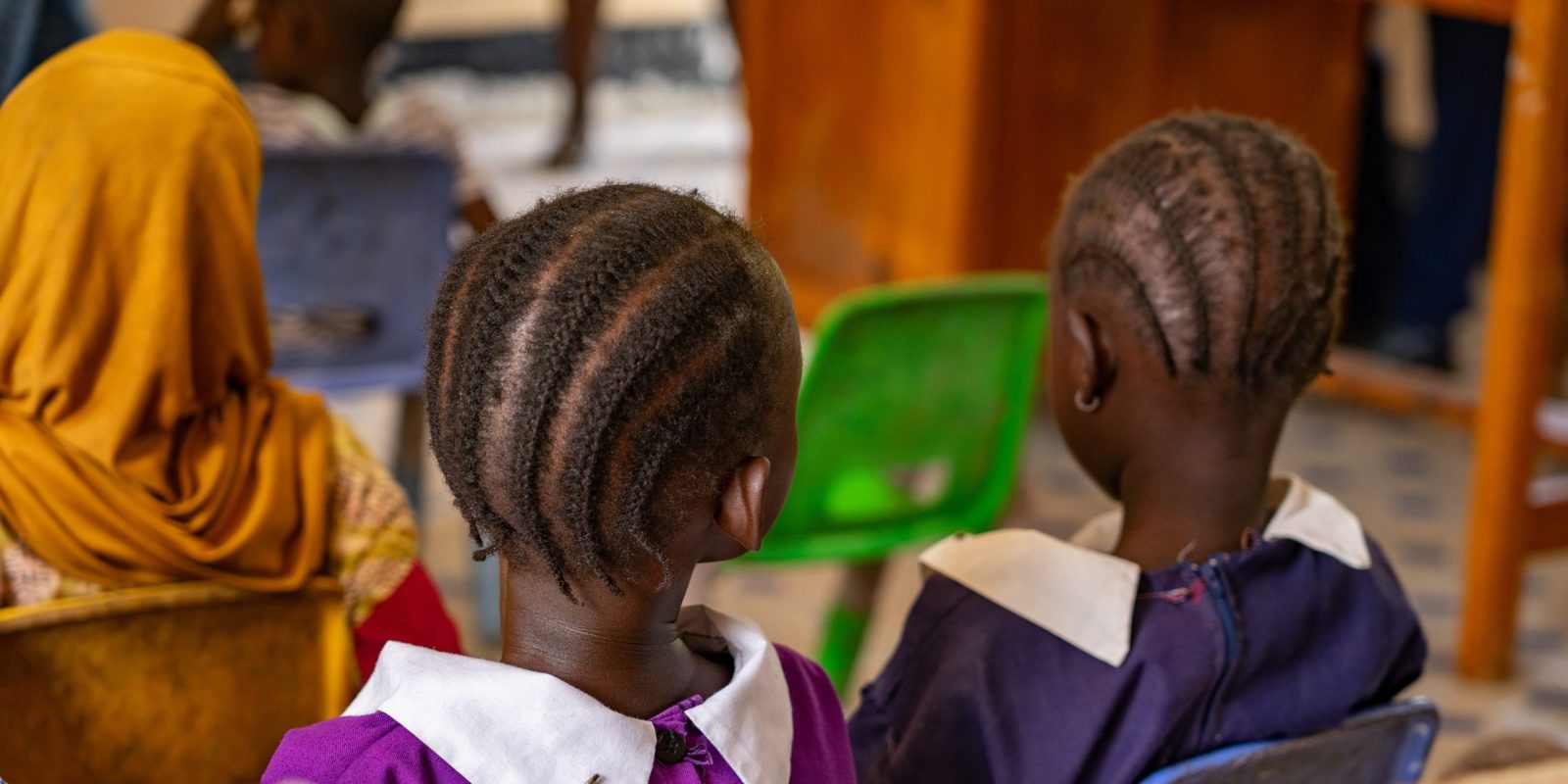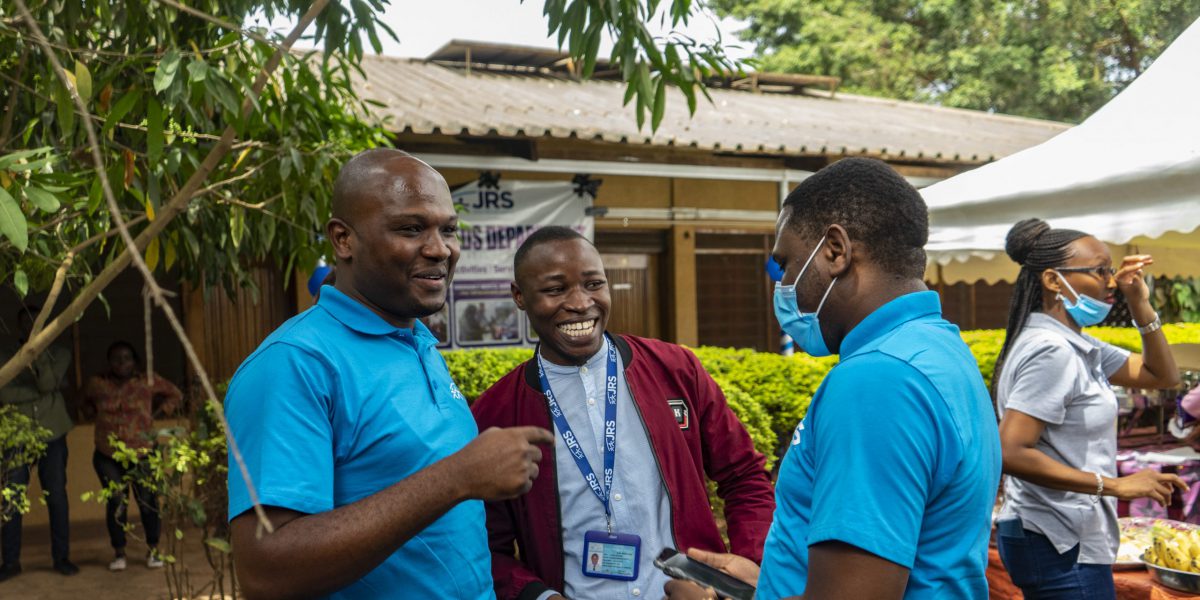
As we celebrate World Humanitarian Day, we decided to reach our staff and ask them few questions:
- Why did you decided to work for an NGO?
- Why is NGO’s work important?
- Share a special memory at work?
- Which are the main challenges faced?
- What do you wish the future to look like?
Read some of the answers shared by our colleagues around the region!
Jeremie Baguma, Database Management Officer – JRS Uganda
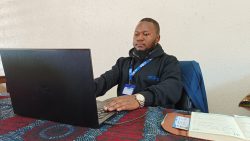
- I wanted to contribute my skills and passion towards addressing global humanitarian challenges and positively impacting vulnerable communities.
- NGOs provide critical humanitarian assistance, respond swiftly to crises, advocate for human rights, and bridge gaps in service delivery where governments and other institutions fall short.
- A special memory at work was witnessing our response to the corona crisis where thousands of hundreds of people were catered for food, medical, and provided shelters during the whole pandemic time.
- My work challenges are resource constraints to ensure a sustainable solution.
- I envision a world where every individual has access to necessities, equal opportunities, and lives free from violence and discrimination. I strive to see a world where empathy and cooperation prevail, leading to lasting peace, social justice, and sustainable development for all.
Achuoni Chiman, Logistics Intern – JRS Kenya
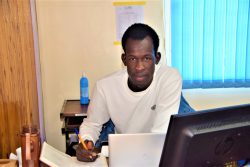
- I decided to work in an NGO because it gives you the opportunity to serve people hence solving problems directly. Different NGOs have different goals but the aim is to always achieve the goals hence making a change in the society.
- NGOs’ work is very important because it improves the lives of the communities they serve, hence solving day-to-day problems.
- Celebrating World Refugee Day that brings together diverse refugee communities, is one of my greatest memories at work.
- The challenge that I encounter the most in this field is limited growth due to my refugee status.
- I would like the NGOs to try as much to base their service to refugees on solidarity rather than on charity.
Esther Namuswa, Finance Administrator – JRS Uganda

- Having worked in a profit-making sector, I wanted exposure in a nonprofit-making sector in which the NGO belongs.
- NGO work has a direct/tangible impact on people’s lives. This impact is long-term.
- One day I was given an opportunity to give a short motivational talk to the girls under the JRS scholarship at St Mary’s Assumption Adjumani -2017. It was a special opportunity to speak positively into the lives of others.
- It is a big challenge to keep up with the increasing and changing compliance demands at different levels.
- I want to see a world of equal opportunity for all.
Samwel Soka, Physiotherapist – JRS South Sudan
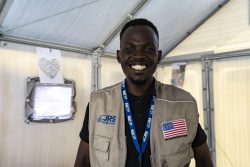
- I decided to work for an NGO because of the need of humanitarian support in the country. South Sudan government is not able to provide all the needed services to their population. As a physiotherapist, I think I can support more my people working from an NGO.
- In South Sudan, NGOs are doing a lot! Many times, in parts of the country where others cannot provide basic services and cover the protection needs due to security or inaccessibility.
The work of NGOs in this country also has a clear impact in the development of certain areas that, without humanitarian intervention, they would still lack many infrastructure and basic services. - I once treated a child with hydrocephalies in Maban. I really felt very attached to that kid… We had to send him to Juba for some urgent surgery, but you know, in NGO world sometimes there is much bureaucracy [specially when it comes to people’s movement], and the boy was getting worst, so it was urgent for us to send him to Juba asap. I forced myself and pushed myself as much as possible to get all the paperwork done fast, and I managed to get it all ready in few days. The kid arrived to Juba on time for surgery and when I could see his improvement and recovery I felt very proud of it. It was very meaningful to me. I can say I really had an impact in a live saving sitiation.
- JRS is the only organization offering this kind of service in Maban, even in the hospitals we are the ones supporting the medical staff to provide such kind of service. So we encounter many people, including doctors, who don’t really understand our work nor its relevance. Also, we work with incentive staff whom we train, but their background education level is too low so when it comes to more bureaucratic duties such as reporting, the quality of what they submit is low and becomes a challenge for us.
The work of NGOs in this country also has a clear impact in the development of certain areas that, without humanitarian intervention, they would still lack many infrastructure and basic services.
Samwel Soka, Physiotherapist - JRS South Sudan
Kibwota Richard Okidi, Livelihood Coordinator – JRS Uganda
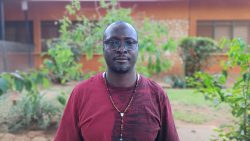
- I find fulfillment in serving those whose rights have been abused in any form.
- NGOs provide hope because they get practically involved in the lives of those they serve.
- I remember once I organized activities with child researchers a children’s parliament and sports galas to promote peace and advocacy.
- There are several challenges I experience in my work but the most outstanding one is beneficiaries’ relapse into vulnerability due to incomplete processes in case management due to time constraints.
- I want to see a world where no one must complain of live challenges deliberately caused by another. Therefore, a Peaceable community and effective co-existence.
Paula Casado Aguirregabiria, Regional Communications and Fundraising Coordinator – JRS Eastern Africa
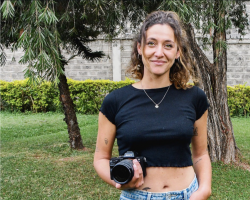
- I always wanted to leave this world making of it a bit of a better place. To leave thinking i made of it a bit of a better place to live in. And I thought that working for an NGO would be the best way of doing it.
- High level politics like diplomacy can make a change in the root causes of humanitarian crisis. Although, these are going to be in the mid and long run. NGO’s work, however, focuses in short and mid term effects, like plasters. The combination of both is key to achieve real change.
- I always share the same memory… I interviewed a young girl in Uganda. It was a very hard and sensitive interview, she struggled to express herself, she had lot to deal with in her mind, you could really see and feel how affected she was by everything she had gone through. When I finished my interview, I asked her (as I always do) “What do you wish for the future?”. After very long 30 seconds of silence, she said “For you to come back.”
That showed me how our comms work does have an impact in the people we serve. It goes beyond explaining stories, is about listening to them, is about caring… about accompanying! - As the biggest challenges, I would mention 2: first, the resources and the long bureaucracy that makes our work less agile and more complicated; second, in a more personal sense, I struggle being so far from my family and my people… it is not easy.
- I wish one day our work (humanitarian) is no longer needed.
Agnes Amajo, Fashion & Design Instructor – JRS Uganda

- I have a passion for serving people.
- NGOs help in changing vulnerable people by rendering services like the skills training that am directly offering in Fashion and Design which are bettering their livelihoods.
- I remember when fashion students got a contract to make masks worth 40 million Ugandan shillings during covid 19 pandemic. This was so amazing for me because most of their livelihoods during that hard time came from that.
- Challenges are sometimes overwhelming numbers of people who come into programs and need our services.
- Women should have equal opportunities just like men.
You can support our operations by making a small donation!

